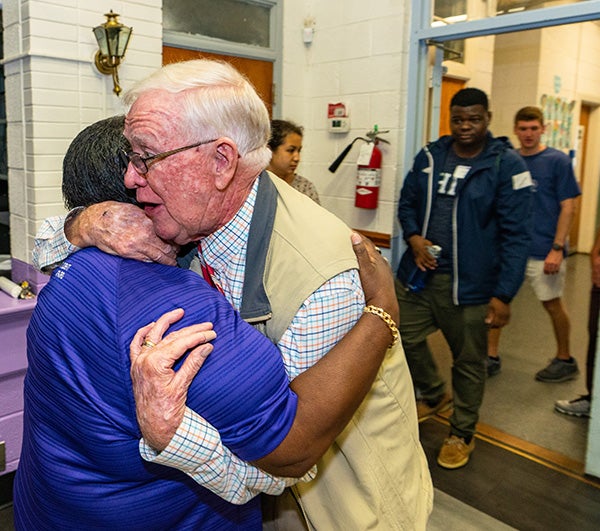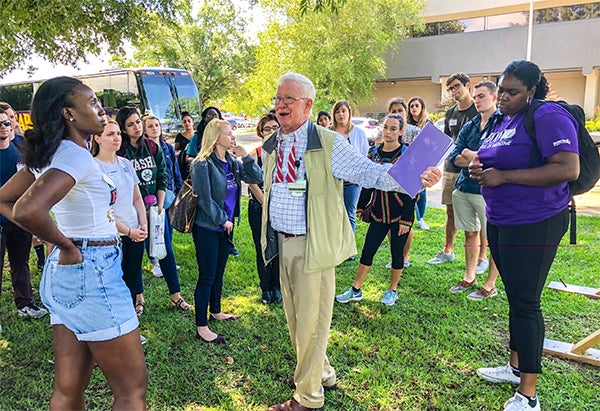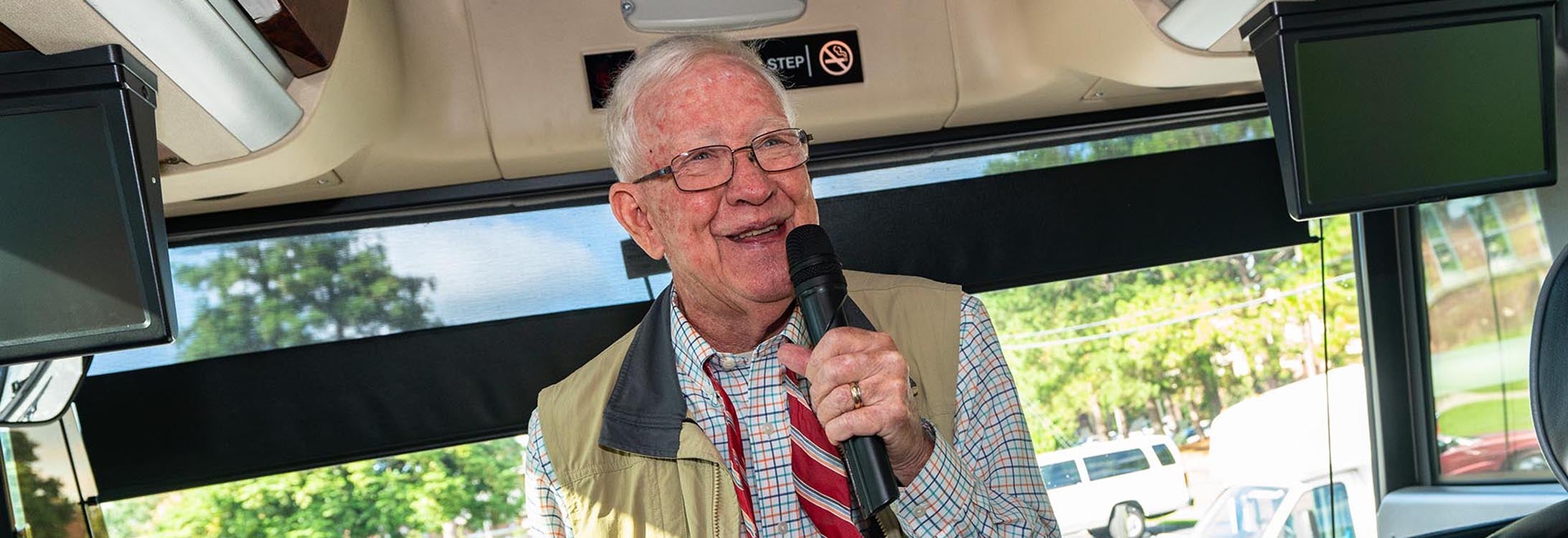VIRTUAL BUS TOUR
Brody School of Medicine professor goes virtual with historical tour of Greenville
Dr. Tom Irons, professor of pediatrics and associate vice chancellor for regional health services at ECU’s Brody School of Medicine, has provided medical students and residents a priceless oral history tour of Greenville for more than two decades.
The tour takes the students to the sites of former schools and churches that were important to the Black community, to the James Bernstein Community Health Center, the Lucille Gorham Intergenerational Center and the city’s homeless shelter.
Irons candidly and passionately leads the students through the city’s history of segregation, controversial urban renewal and devastation caused by Hurricane Floyd in 1999. He also takes them to neighborhoods within a half mile of Brody where health status indicators are terrible, where the HIV rate approaches 25 percent and where preventable cancer rates are 400 percent higher than other areas of North Carolina.
He does this tour multiple times every year because he says it is important for the students to know that what determines health is more than just access to health care.
“I think it puts them in the right frame of mind to learn and to serve others,” Irons said. “I believe a vast majority of people who come to medical school have in them a spark of desire to serve. And when you awaken that, it puts it into some context that they’re not just here to become a doctor and take care of sick people, but that there’s something of a higher meaning to their lives.”
This year was different, however, as the COVID-19 pandemic forced the bus tour to move online. And for the first time, Irons was nervous.
“I feel no stress at all when I’m at the live event. I’m in it, I’m immersed in it and they’re there with me,” he said. “But this time, I was quite anxious. I was up late the night before, adjusting things and changing things because I didn’t know what to expect.”
Irons – who is also scheduled to give the tour to first-year dental students and multiple groups of residents – began the virtual tour by explaining to the students that the discussion would be mostly stories from his own life and the lives of his doctor parents, who moved to Greenville after World War II and helped to desegregate Pitt County Memorial Hospital.
“It really is a story told through my eyes, my life experiences and the life experiences of my parents,” said Irons, who used PowerPoint slides, historical photos and a video from a tour he gave in 2018 to illustrate his narrative. “I am not a historian. I am a person who has lived an experience and I want to share it, because I think I have a unique perspective.”
The importance of being kind
Even though this year’s experience was not in-person, Irons did not stray from the kind of open and honest dialogue – particularly involving racial disparities and injustices – that have made his tours so popular. And Irons said the important events that have thus far defined 2020, including the pandemic and the Black Lives Matter movement, helped to further shape this year’s message.
“What I had to do differently this time was keep them focused on the reasons why all of this has boiled over and is smelling up the whole kitchen. And think about what we can do to solve it,” Irons said of the fight for equality. “Because you can’t go back in the kitchen and slam a lid on a boiling over pot – you’ll just have more boiling over. It isn’t going to go away; you have to find a way to decrease the heat and get people talking together in a kind and compassionate way.”

Deborah Moody, director of the Lucille W. Gorham Intergenerational Community Center, greets Dr. Tom Irons during a stop of a bus tour of Greenville for first-year medical students in 2018. (Photo taken pre-COVID-19 by Cliff Hollis)
Irons said he also felt more strongly than ever this year that he needed to convey the importance of being kind.
“During the pandemic, my goodness, it’s been easy not to be kind. But you have to have self-awareness,” he said. “I think a person has to live one’s values. Congruence is a big deal. And one’s behaviors have to be congruent with one’s stated beliefs. And if they’re not, their stated beliefs don’t mean a darn thing.”
And as always, his message was not lost on the students.
“This tour really resonated with me and made me even more confident in my decision to pursue my medical education at Brody,” said Heerali Patel, a first-year medical student and Brody Scholar.
“It is incredibly important to address the history of the Greenville community with incoming Brody students in order to inform us about the systemic barriers in access to health care that affect the people we will soon be working with,” Patel added. “This conversation demonstrated that our role as future physicians entails not only being competent providers in the clinical space, but also compassionate members of the community that are dedicated to helping out where needed.”
While he was disappointed that he was not able to experience the in-person tour, Michael Burt – a first-year medical student and Brody Scholar – said the virtual tour still retained a lot of its value and was his favorite orientation session.
“I think having this conversation prepares us to enter our medical education thinking critically about forces beyond the walls of a hospital or clinic that influence the health status of vulnerable populations,” Burt said. “By teaching us about these social inequities within the context of his own meandering life and choices, he not only illuminated the systemic issues for us, but also offered his own life story up as an example of how individual service and community engagement can help be a solution to those issues. In doing so, he brought these issues to ground-level and reminded me how much small actions can create change.”
The value of doing good
When the tour is in person, Irons meets every student as they exit the bus to thank them. The students typically thank him back with enthusiastic handshakes or hugs.

Dr. Tom Irons tells medical students about the historical significance of Greenville’s Town Common. (Photo by Rob Spahr)
“It always feels good when they come by and say thank you,” Iron said. “I always feel a great sense of relief and I also feel very emotional about having had an impact on them.”
This year, those demonstrations of gratitude were confined to a message board and Irons was not prepared for the impact it had on him.
“The emotional force of seeing all of those comments coming across the chat in front of me was something,” he said. “When they started writing their messages in the chat, it was really touching. And all of sudden, I was just showered with them and they just kept coming in. It was so kind and just so appreciative, that it brought me to tears and I just sat there and cried.
“It blesses my heart and makes me feel worthwhile,” he added.
But Irons’ impact extends far beyond the tours he gives. It can be seen in the countless children he’s treated as a pediatrician, medical students he’s inspired as a professor, lives he’s touched through tireless community service, and through the two College of Nursing scholarships he established in memory of his late wife, Carol.
“In some ways, we all want to be remembered. In my case, I particularly want my wife to be remembered,” he said. “I’ve reflected a lot during this pandemic about what it means to be remembered. And we will all eventually be forgotten in some way. But if we’ve done some good, I think that stays and gets to stay forever. I think that in the end we only amount to what we have done for others, what we’ve done that is good. And I’m satisfied with that.”
